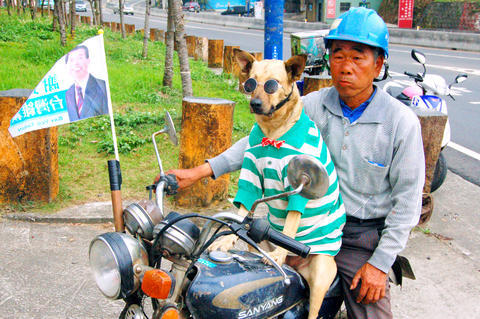To vote for the Chinese Nationalist Party (KMT) in Saturday's presidential election would be to endorse one-party rule, Democratic Progressive Party (DPP) presidential candidate Frank Hsieh (
"One-party rule is bound to have far-reaching repercussions on the development of democracy and people's livelihoods," Hsieh said.
Since the KMT won the legislative election in January, many have wondered whether the country's hard-earned democracy is doomed, he said.

PHOTO: TUNG CHEN-KUO, TAIPEI TIMES
Hsieh made the remarks after visiting Huang Kun-yen (
Urging undecided voters to come out and vote, Huang said he was worried the KMT's control of both the legislature and the executive would corrupt the party, whose lust for power manifested itself during its 50-year authoritarian rule.
"Power corrupts," he said. "Compared with the KMT's half-a-century rule, eight years of DPP rule is too short. We need another party to act as a check on the KMT's power."
If the KMT establishes the "cross-strait common market" and recognizes Chinese academic credentials, Huang said he expected medical quality to deteriorate, as there are as many as 5,000 medical practitioners in China waiting to enter the Taiwanese market.
While the KMT promised not to abuse its power if elected, Hsieh said the public could not afford to count on the party's goodwill alone.
"What if it [the KMT] cannot deliver on its promises? The only thing people could do is cry," he said. "We must establish a system in which the government continues to operate, but with checks and balances -- no matter who is in power."
If elected, Hsieh said, he promised to share administrative powers with the KMT and appoint a KMT member as premier.
The country would not be in idle spin, there would no longer be political infighting and government budgets would not be boycotted, Hsieh said. He would act as the gatekeeper of cross-strait policy and ensure that Taiwan-centered consciousness, national security and sovereignty are upheld while opening up to China.
At a separate setting yesterday, former national policy adviser to the president Huang Tien-fu (黃天福) expressed similar concerns, saying that Beijing's bloody crackdown on Tibet reminded him of the KMT's authoritarian rule.
"I'm afraid that Taiwan will become the next Tibet," he said. "If the KMT wins the election, we don't know when we will [get the presidency] back."
Huang Tien-fu is the brother of former DPP chairman Huang Hsin-chieh (黃信介), one of the individuals accused during the Kaohsiung Incident.
Also known as the Formosa Incident, the Kaohsiung Incident occurred on Dec. 10, 1979, when the KMT government cracked down and imprisoned participants in an anti-government parade organized by Formosa magazine.

Taiwan is stepping up plans to create self-sufficient supply chains for combat drones and increase foreign orders from the US to counter China’s numerical superiority, a defense official said on Saturday. Commenting on condition of anonymity, the official said the nation’s armed forces are in agreement with US Admiral Samuel Paparo’s assessment that Taiwan’s military must be prepared to turn the nation’s waters into a “hellscape” for the Chinese People’s Liberation Army (PLA). Paparo, the commander of the US Indo-Pacific Command, reiterated the concept during a Congressional hearing in Washington on Wednesday. He first coined the term in a security conference last

Prosecutors today declined to say who was questioned regarding alleged forgery on petitions to recall Democratic Progressive Party (DPP) legislators, after Chinese-language media earlier reported that members of the Chinese Nationalist Party (KMT) Youth League were brought in for questioning. The Ministry of Justice Investigation Bureau confirmed that two people had been questioned, but did not disclose any further information about the ongoing investigation. KMT Youth League members Lee Hsiao-liang (李孝亮) and Liu Szu-yin (劉思吟) — who are leading the effort to recall DPP caucus chief executive Rosalia Wu (吳思瑤) and Legislator Wu Pei-yi (吳沛憶) — both posted on Facebook saying: “I

The Ministry of Economic Affairs has fined Taobao NT$1.2 million (US$36,912) for advertisements that exceed its approved business scope, requiring the Chinese e-commerce platform to make corrections in the first half of this year or its license may be revoked. Lawmakers have called for stricter enforcement of Chinese e-commerce platforms and measures to prevent China from laundering its goods through Taiwan in response to US President Donald Trump’s heavy tariffs on China. The Legislative Yuan’s Finance Committee met today to discuss policies to prevent China from dumping goods in Taiwan, inviting government agencies to report. Democratic Progressive Party Legislator Kuo Kuo-wen (郭國文) said

The Ministry of Economic Affairs has fined Taobao NT$1.2 million (US$36,900) for advertisements that exceeded its approved business scope and ordered the Chinese e-commerce platform to make corrections in the first half of this year or its license would be revoked. Lawmakers have called for stricter supervision of Chinese e-commerce platforms and more stringent measures to prevent China from laundering its goods through Taiwan as US President Donald Trump’s administration cracks down on origin laundering. The legislature’s Finance Committee yesterday met to discuss policies to prevent China from dumping goods in Taiwan, inviting government agencies to report on the matter. Democratic Progressive Party